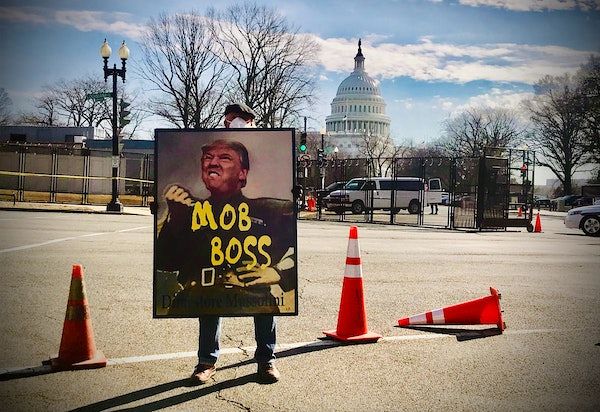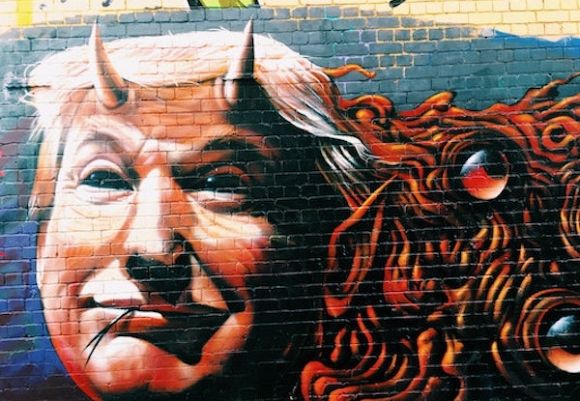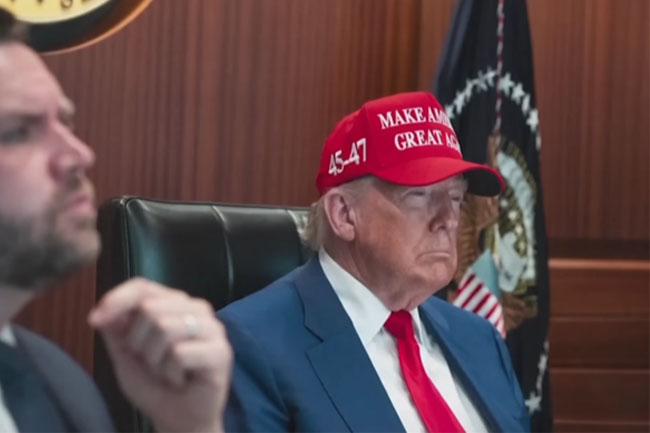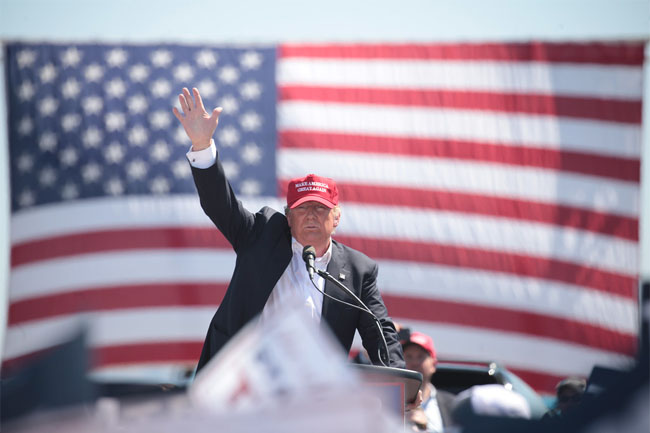As Republicans refuse to investigate the Capitol attack and continue to embrace Trump, America remains at high risk of further political violence, writes George Grundy.
THIS TIME there’s no doubt as to the protagonists. Donald Trump and senior members of his family and Administration fomented a violent attack on the United States Capitol, on the day the 2020 election results were due to be certified by the United States Congress.
The aim was clearly to disrupt or stop the vote count that confirmed Joe Biden as President. Rioters had come prepared, wearing gas masks and combat fatigues, and carrying plastic cuffs and pepper spray. Extremist groups had planned their actions in advance. Bombs were placed around Washington. The crowd chanted "hang Mike Pence". A wooden gallows was erected.
For the second Republican Administration in a row, an attack was carried out on U.S. soil that aimed, at the very least, to disrupt or even decapitate political leadership — the success of which might reasonably have allowed the sitting president to declare martial law.
On 6 January, it came very close. Rioters came within metres of Vice-President Pence and missed meeting him on the floor of Congress by no more than a minute. Prominent Democrats like Alexandria Ocasio-Cortez escaped by the skin of their teeth.
When violent political insurrectionists chant about hanging the Vice-President, it’s best to take them at their word. With just a little less good fortune, Pence might have ended up in the hands of the mob. Just imagine the ramifications, had an American vice-president been murdered at the hands of a group whose actions were inspired by the sitting president. There would have been no one to certify Biden’s win. America would most probably be in some form of civil war right now. It doesn’t bear thinking about.
Yet perhaps it is something to think about because a third attack on American democracy is taking place – in plain view – and this one seems much more likely to succeed. Republicans are now refusing to investigate the January attacks and passing legislation that may cause a democratic crisis as early as next year.
Blocking an Inquiry
From the assassination of John F. Kennedy through to the Challenger disaster and 9/11 terrorist attacks, there is a long history of bipartisan support for the investigation of American catastrophes. Yet five months on from the worst attack on the U.S. Capitol since 1814, Republicans refuse to negotiate an investigation into the events of 6 January in good faith. Many commentators suggest that this intransigence is motivated by Republican fear of what might be uncovered.
Any proper investigation would ask a series of profoundly uncomfortable questions, such as:
- What actions did Donald Trump take as the attacks took place and what explains his reluctance to quickly issue a public statement calling for the attacks to end?
- What happened in the conversation between Trump and Republican House Minority Leader Kevin McCarthy?
- Did Republican house members give future rioters tours around Congress in the days before the attacks?
- What warnings had congressional members and law enforcement agencies received prior to 6 January, and what explains the hours-long delay in the deployment of the National Guard and other defence personnel that day?
- What connections were there between senior members of the Trump Administration and the militias that carried out and coordinated the attacks?
A forensic investigation of the events of 6 January would demand answers to these and other key questions — but we already know a great deal and the implications may prove devastating for Trump and the Republican party.
Donald Trump openly fomented an attack on his own government in which the vice-president was very nearly murdered. The attackers' actions married neatly with Trump’s fervent wish to retain political power. As such, Trump clearly hoped to use violence to end America’s democratic process — something he had already said he would not abide by.
A number of people closely linked to Trump’s Administration (like political lobbyist Roger Stone, who spoke at a "March to Save America" rally on the night of 5 January and whose personal security was provided by the Proud Boys) have been closely linked to the militia groups that planned the attacks in advance. These groups may have been assisted by ultra-Right-wing Republican members of Congress. It seems very likely that militia leaders and senior Republicans met in the week prior to the attacks, including on 5 January at Trump’s hotel in Washington.
The unprecedented decapitation of the civilian arm of the Department of Defense (after November’s election, putting wildly unqualified Trump appointees in key positions) may also explain why an effective law enforcement response took so long on 6 January, leaving the Capitol virtually undefended for hours.
An investigation uncovering proof of revelations such as these would constitute a threat to the very existence of the Republican Party. Mounting an attack on your own government is a coup. Treason. So Republicans find themselves painted into a corner, trapped by the impossibility of giving in to an inquiry in which many investigators would also be the suspects.
But there’s more.
Legislating Democracy’s End
In fact, 6 January was just part of a broader attempt to overturn the result of the 2020 Election and functionally cripple America’s democracy — an effort that continues to this day. Trump’s "big lie" (that in fact, he won the election) continues to be weaponised by the former president and propagandised by the Republican party, as justification for a tidal wave of anti-democratic legislation sweeping statehouses across America.
Having lost control of Congress, the Senate and the White House, a moment of Republican introspection might have been expected. Instead, the "big lie" has allowed grassroots Republicans to entertain the circular logic that if Trump was indeed cheated, then the election was a fraud and thus fixing the flaws in how Americans vote is vital to the future of the country.
Of course, this is nonsense. The 2020 election was declared the most secure in American history by Trump’s own officials. Dozens of lawsuits brought after the election were thrown out, often by judges appointed by Trump. Investigation after investigation has found no substantive irregularities. Trump never gained an approval rating of more than 47 per cent and trailed in every poll coming into the election.
But after four years of Donald Trump, Republicans appear to have lost their grip on reality. Half of them believe Trump is still the actual president and with the "former guy" reportedly telling people that he expects to be restored to the White House by August, his followers are taking steps to avoid losing ever again.
Republican state legislators have passed hundreds of anti-democratic bills in the wake of November’s election. In Texas, Governor Greg Abbott’s Senate Bill 7 limits early voting and voting by mail, as well as reducing polling locations. Georgia has made it a crime to give water to people waiting in line to vote. It is not by chance that much of the legislation overtly targets black and minority voters, who tend to vote Democratic.
As America’s demography changes, the retention of white political power remains central to Republican efforts to reshape how America votes and serious-minded political commentators now speculate whether Republicans will certify Democratic wins in the future.
To further illustrate the seriousness of what is taking place, some historians (such as Benjamin Carter Hett) have begun to draw chilling parallels to pre-war Germany and 1923’s "Beer Hall Putsch" — the failed coup that redirected Hitler’s focus to legally undermining Germany’s democracy as a means to power.
Unless Joe Biden is able to reform the filibuster and pass the John Lewis Voting Rights Act – which would force states to clear their voting laws with the Federal Government – prior to mid-term elections late next year, Republicans may finally have found a way to mortally undermine America’s democracy.
It Couldn’t Happen There
The long period of global peace that followed World War II has allowed us to presume that democracy is the natural, permanent way of things and that calamitous collapse is impossible. It isn’t. Democracies come and go; freedoms wax and wane.
Greece only became a democracy in 1974, Spain as late as 1977. For a while it seemed like Russia would become a functioning democracy — now the country is little more than a mafia state. Across the world, countries as diverse as Brazil, Poland, Hungary and the Philippines have elected authoritarian strongmen who seem hell-bent on retaining power at all costs. In 2021, tyranny is on the rise and democratic freedom under threat.
And the biggest of them all is America, whose democracy has narrowly avoided violent collapse on at least two occasions already this century. The Republican Party – once home to Abraham Lincoln – is no longer recognisably conservative, but acts as an ethno-nationalist, pseudo-populist movement devoid of political ideas and wedded to the pursuit of power at all costs — some say, the most dangerous organisation on Earth.
The attacks on 6 January represent the greatest domestic crime in modern American history. For the first time since the country was established, there wasn’t a peaceful political transfer of power after an election. As Republicans refuse to countenance an investigation and continue to embrace Trump’s "big lie", America remains at high risk of further political violence.
Failed coups are often used as dress rehearsals. On the evening of 6 January when 147 Republicans returned to the house and voted to overturn the election results, it was made clear that an entire political party is willing to give a pass to violent insurrection.
The Biden Administration often seems to be bringing a knife to a gunfight, hoping for bipartisanship in an age when that prospect is long gone. Democrats have held all three levers of power for just four of the last twenty-four years.
If sweeping reforms aren’t passed prior to next year’s mid-term elections, American democracy will be placed in the hands of state-level Republicans who have vowed not to respect the will of the people. American democracy will die, dealing a historic blow to the hope that mankind can remain free.
The stakes could not be higher.
George Grundy is an English-Australian author, media professional and businessman. Read more from George on his blog americanprimerweekly.com or follow him on Twitter @georgewgrundy.
Related Articles
 This work is licensed under a Creative Commons Attribution-NonCommercial-NoDerivs 3.0 Australia License
This work is licensed under a Creative Commons Attribution-NonCommercial-NoDerivs 3.0 Australia License
Support independent journalism Subscribe to IA.
















